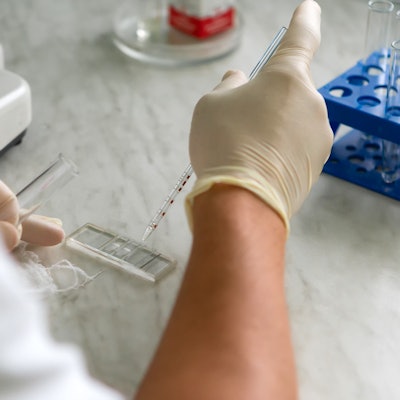
The level of C-reactive protein (CRP) in the blood of coronavirus patients could help safely guide treatment with steroids, which have the potential to save many thousands of lives, researchers reported July 22 online in the Journal of Hospital Medicine.
As an indicator of inflammation, CRP has been used in many different clinical scenarios, though its nonspecific nature is a downside. In this observational study, which was conducted at the Albert Einstein College of Medicine in the Bronx, New York, researchers analyzed efficacy and safety of systemic treatment with glucocorticoids -- an emerging and promising treatment option for coronavirus -- and how outcomes were associated with levels of CRP. Steroids are widely available as is the CRP lab test, they noted.
Out of 1,806 patients who were hospitalized with COVID-19, 140 were treated early with steroid therapy -- mostly prednisone, but also including some on dexamethasone and methylprednisolone -- and did not suffer worse mortality or need mechanical ventilation.
But drilling down on the results, those whose CRP was high -- defined as greater than or equal to 20 mg/dL -- had significantly reduced risk of mortality or ventilation, and conversely, those with low or normal CRP -- less than or equal to 10 mg/dL -- had a higher risk for needing ventilation or dying. The CRP results were evident in analyses whether the data were adjusted or not adjusted for clinical characteristics of the patients.
"The public health implications of these findings are hard to overestimate," Dr. Marla Keller, professor of medicine (infectious diseases) at Albert Einstein, and colleagues reported. "Given the global growth of the pandemic and that glucocorticoids are widely available and inexpensive, glucocorticoid therapy may save many thousands of lives."
Furthermore, lives could be saved by knowing who shouldn't get steroid therapy, they suggested.
Strength in subgroup analyses
The study was conducted to evaluate experience with systematic steroid treatment for the novel coronavirus in New York City, a hotspot during the pandemic, with 17,000 confirmed deaths as of early June, most commonly attributed to acute respiratory distress syndrome (ARDS). Mechanical ventilation has been associated with mortality and the role of steroid treatment has been unclear. There is some evidence supporting the use of dexamethasone for COVID-19 during the pandemic, but this class had not been thought to be beneficial for ARDS before the public health emergency. Among other things, researchers wanted to evaluate whether early steroid treatment could keep people alive and off ventilators.
The study considered outcomes for patients hospitalized between March 11 and April 13 at four hospitals run by the Montefiore Medical Center in the Bronx.
"Because the outcomes of in-hospital mortality and in-hospital [mechanical ventilation] cannot be assessed in patients still hospitalized, we included only patients who either died or had been discharged from the hospital," the authors explained.
The study also focused its inclusion criteria on those given glucocorticoids within 48 hours of admission versus those who were never treated with them. Subgroup analyses assessed certain biomarkers, such as CRP and D-dimer levels, the latter of which have also been associated with inflammation and severity of COVID-19.
"Our findings suggest a role for CRP to identify patients who may benefit from glucocorticoid therapy, as well as those in whom it may be harmful," the authors wrote. "Additional studies to further elucidate the role of CRP in guiding glucocorticoid therapy and to predict clinical response are needed."
The authors also noted that the results are in line with findings of the U.K. Randomised Evaluation of COVID-19 therapy (RECOVERY) study, which found a mortality benefit for hospitalized COVID-19 patients treated with the steroid dexamethasone.



















